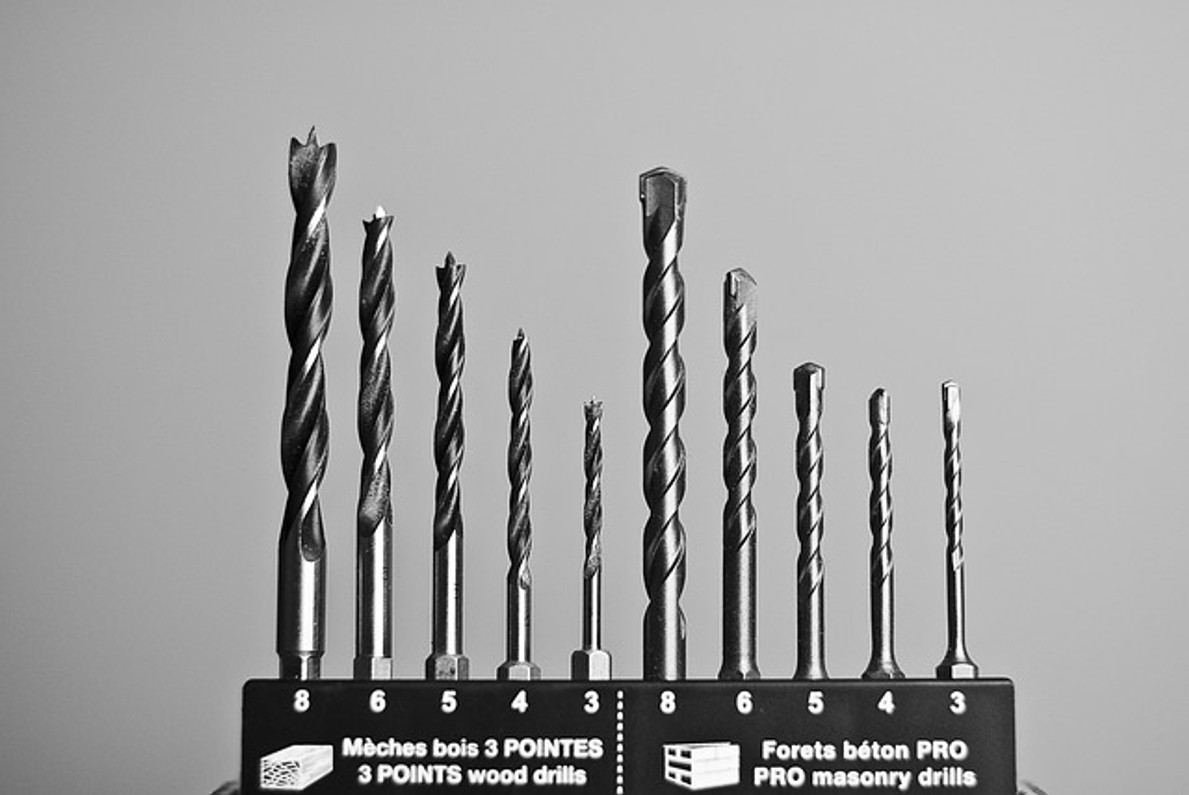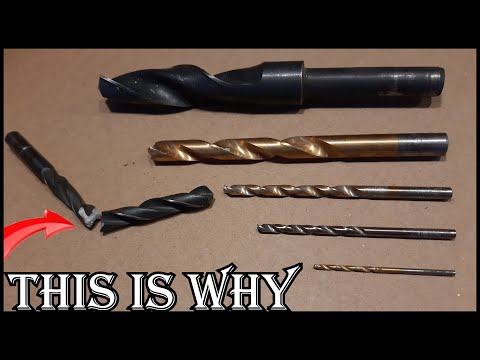Are you getting frustrated because your drill bits keep breaking? Trust me, you’re not alone. It can be super annoying when it feels like you’re constantly replacing them. But don’t worry, I’m here to help you figure out why this keeps happening and how you can avoid it in the future.
Breaking drill bits can happen for a variety of reasons, from using the wrong type of bit for the material you’re drilling into to applying too much pressure. In this guide, we’ll explore the common causes of drill bit breakage and provide you with some practical tips to prevent it from happening.
So, if you’re ready to put an end to your drill bit dilemma and keep those bits intact, let’s dive right in!

Why Do I Keep Breaking Drill Bits?: Understanding the Common Causes
Drilling is an essential task for many DIY enthusiasts and professionals alike. However, one frustrating issue that can arise is the frequent breakage of drill bits. It not only hampers progress but also adds to the cost of the project. To help you overcome this obstacle, we will explore the common causes of drill bit breakage and provide practical tips to prevent it from happening in the future.
The Importance of Proper Drill Bit Selection
Using the correct drill bit for the task at hand is crucial in preventing breakage. Different materials require specific drill bits to effectively cut through them. For example, using a wood drill bit on metal will likely result in breakage. Before starting any drilling project, take the time to research and understand the appropriate bit for the material you are working with.
Furthermore, consider the size and quality of the drill bit. Using a dull or worn-out bit will increase the chances of breakage. Replace bits that show signs of wear and tear, such as dull points or chipped edges. Investing in high-quality drill bits may cost more upfront but will save you money in the long run, as they are designed to withstand greater stress and provide more precise results.
The Role of Proper Technique
Another common cause of drill bit breakage stems from improper drilling technique. Applying excessive pressure while drilling can cause bits to snap. It is important to let the drill bit do the work and not force it through the material. Applying steady and consistent pressure will yield better results and reduce the risk of breakage.
Additionally, ensure that the drill is set to the appropriate speed for the material. High speeds combined with excessive force can lead to overheating and eventual breakage. Refer to the manufacturer’s guidelines or consult online resources for recommended drill speeds for different materials.
Lastly, it is essential to keep the drill bit perpendicular to the material being drilled. Angling the drill can put unnecessary stress on the bit, making it more prone to breakage. Take your time, use proper technique, and maintain a steady hand to ensure a successful drilling experience.
Working with Hard or Brittle Materials
Hard or brittle materials, such as porcelain tiles or concrete, present their own set of challenges when it comes to drilling. These materials are more likely to cause drill bits to break if not addressed correctly. To prevent breakage when working with such materials:
- Use specialized drill bits designed for hard or brittle materials. These bits have a different composition and cutting edge to handle the increased stress.
- Apply a gentle touch and avoid applying excessive force. Let the drill bit slowly work through the material to reduce the risk of breakage.
- Consider using a drilling guide or template to ensure clean and precise holes. This will help prevent the drill bit from slipping or wandering, which can lead to breakage.
By understanding the specific challenges posed by hard or brittle materials and utilizing the appropriate techniques and tools, you can significantly reduce the risk of breaking drill bits during your projects.
Maintaining and Storing Drill Bits
Proper maintenance and storage of drill bits play a crucial role in their longevity and performance. Here are some tips to ensure your drill bits remain in optimal condition:
- Regularly clean drill bits after each use to remove debris and buildup that can affect their cutting ability.
- Inspect the condition of the drill bits before each use. Look for signs of damage, such as chips or cracks, and replace any compromised bits immediately.
- Store drill bits in a sturdy container or organizer that keeps them separated and protects them from damage. Avoid tossing loose drill bits in a toolbox where they can knock together and cause chipping or breakage.
- Consider investing in a drill bit sharpener to prolong the life of your bits. Sharpening dull bits can restore their cutting ability and reduce the risk of breakage.
Preventing Drill Bit Breakage: Additional Tips and Tricks
While understanding the common causes of drill bit breakage is essential, here are a few additional tips to help you prevent this issue:
Use cutting lubricants:
When drilling through certain materials, such as metal, applying a cutting lubricant can reduce friction and heat buildup. This reduces the likelihood of drill bit breakage and prolongs the life of your bits.
Start with a smaller pilot hole:
For larger holes, it is often beneficial to start with a smaller pilot hole to guide the larger drill bit. This reduces the stress on the larger bit, making it less prone to breakage.
Take breaks to prevent overheating:
Extended drilling sessions can cause the drill bit and material to overheat, increasing the risk of breakage. Take occasional breaks to allow both the bit and material to cool down before resuming drilling.
By combining proper drill bit selection, employing correct drilling techniques, understanding the challenges of different materials, and maintaining and storing your drill bits appropriately, you can significantly reduce the occurrence of drill bit breakage. Take the time to invest in quality drill bits and learn the best practices for drilling various materials. Your projects will progress more smoothly, and you’ll save time and money in the long run.
Key Takeaways: Why Do I Keep Breaking Drill Bits?
1. Check the quality of your drill bits – lower-quality bits are more prone to breaking.
2. Use the correct drill bit for the material you are drilling into.
3. Avoid applying too much pressure or force when drilling.
4. Keep your drill bits sharp by regularly sharpening or replacing them.
5. Make sure your drill is set to the appropriate speed for the task at hand.
Frequently Asked Questions
Are you tired of constantly breaking your drill bits? Here are some common questions and answers that might shed some light on why it keeps happening.
1. What are some reasons why my drill bits keep breaking?
There could be several reasons why your drill bits keep breaking. One possibility is that you are using the wrong type of bit for the material you are drilling into. Different materials require different types of bits, so make sure you’re using the appropriate one.
Another reason could be that you’re applying too much pressure while drilling. Let the drill do the work and avoid pushing down too hard as it can cause the bit to snap. Additionally, if your drill bits are old or worn out, they may be more prone to breaking. Inspect them regularly and replace them if necessary.
2. How can I prevent my drill bits from breaking?
To prevent drill bit breakage, start by choosing the right bit for the job. Make sure it is designed for the specific material you are drilling into. If you’re unsure, refer to the manufacturer’s recommendations or consult an expert for guidance.
It’s also crucial to maintain the correct drilling speed. Drilling too fast or too slow can put excessive strain on the bit, leading to breakage. Find the optimum speed for the material you’re drilling through, and use a steady hand to maintain a consistent drilling motion.
3. Could overheating be causing my drill bits to break?
Yes, overheating can be a common culprit behind drill bit breakage. When a bit gets too hot, it can lose its temper, becoming more brittle and prone to breaking. This can happen if you’re drilling for extended periods without allowing the bit to cool down. Some materials, like metal, generate more heat during drilling, so it’s essential to use lubrication or cooling techniques to prevent overheating.
Moreover, using excessive force while drilling can also lead to overheating, as it causes more friction. Allow the drill bit to do the work and apply moderate pressure to avoid unnecessary heat buildup. If you notice your drill bit becoming hot to the touch, it’s time to take a break and let it cool down.
4. Can a dull drill bit cause it to break?
While a dull drill bit won’t necessarily break on its own, it can contribute to a higher likelihood of breakage. A dull bit requires more force to drill through material, which can put additional strain on it and make it more prone to snapping. It’s important to regularly sharpen or replace dull drill bits to maintain their effectiveness and prevent unnecessary breakage.
Furthermore, a dull bit can also cause the material you’re drilling into to splinter or chip, which can affect the structural integrity of your workpiece, potentially leading to breakage in the long run. Always ensure your bits are sharp and ready for the task at hand.
5. Are there any other factors that could be causing my drill bits to break?
Yes, there are a few other factors that could contribute to drill bit breakage. One is using excessive force or “hammering” when drilling with a standard rotary drill. While some materials may require more forceful drilling, others can be damaged by this technique. Consider using special drill bits designed for hammer drills or impact drivers for tougher materials.
Additionally, inadequate drilling technique or improper alignment can also cause drill bits to break. Make sure you’re applying even pressure, drilling at the correct angle, and avoiding lateral forces that can bend or break the bit. Proper technique and alignment can go a long way in preventing drill bit breakage.

Summary
Drill bits break because of too much pressure, wrong drilling technique, or using dull bits. Make sure to use the right drill bit for the material and take breaks to prevent overheating.
It’s important to practice proper drilling techniques, such as using a steady hand, applying consistent pressure, and avoiding tilting the bit. By following these tips, you can avoid breaking drill bits and ensure successful drilling projects.
